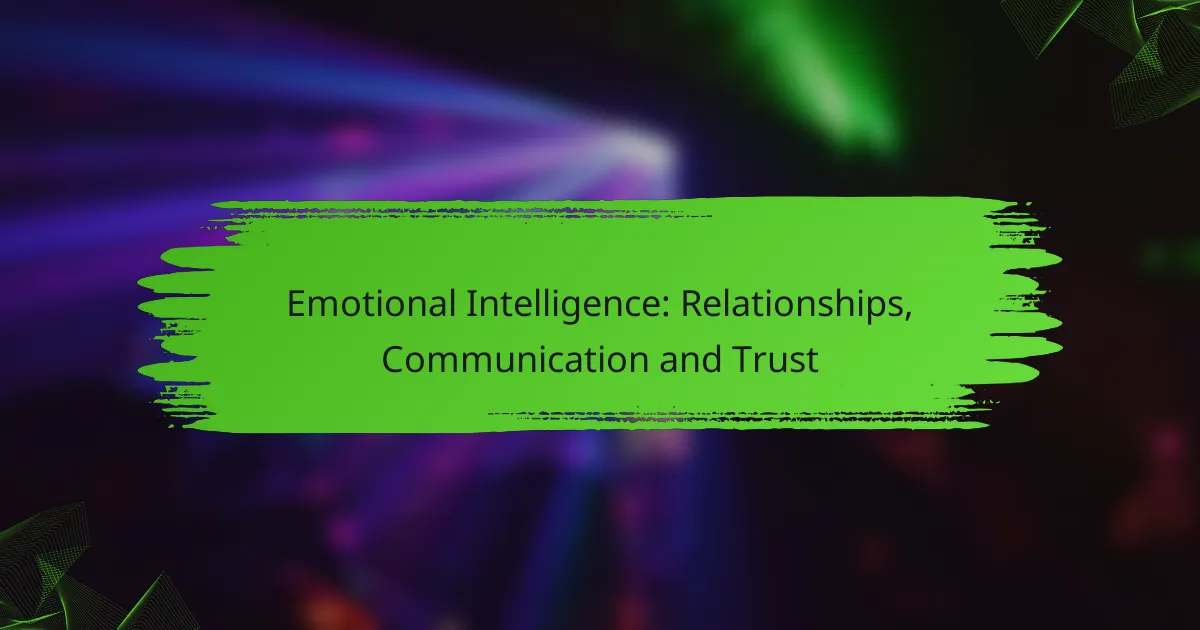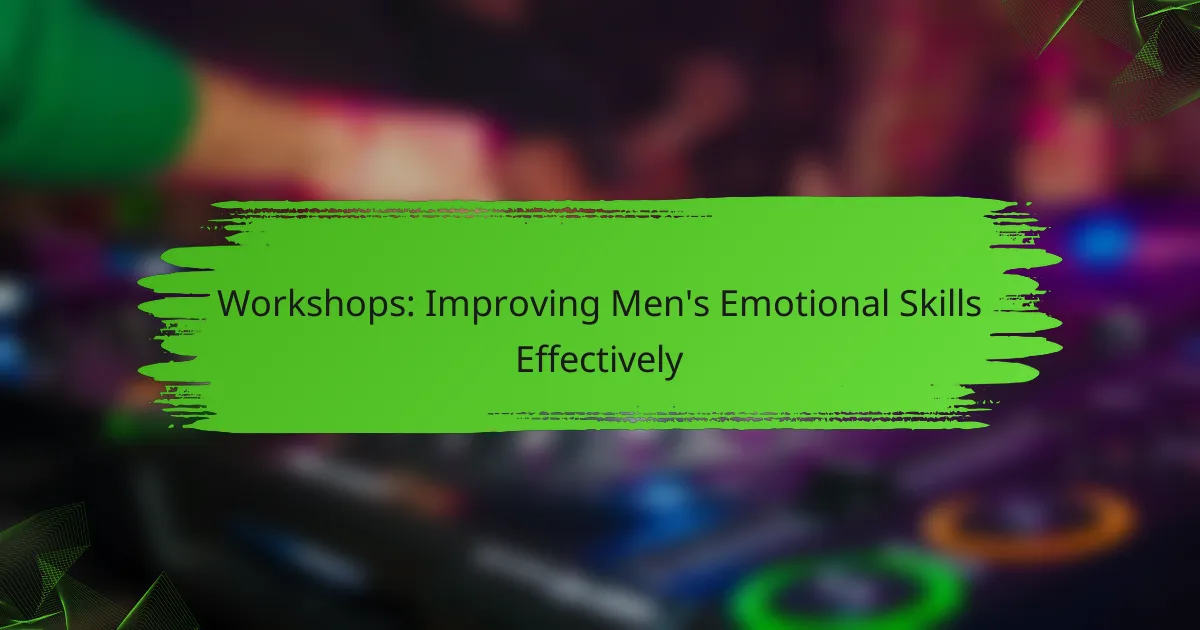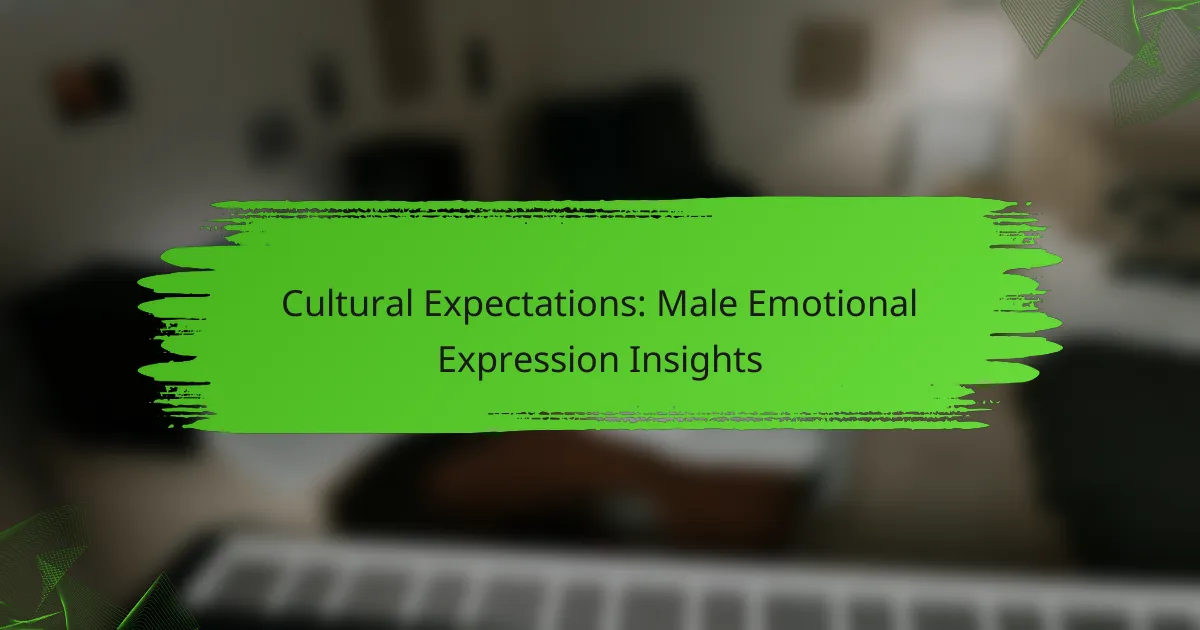Emotional intelligence (EI) plays a crucial role in enhancing relationships by allowing individuals to understand and manage their own emotions while effectively recognizing the feelings of others. This skill set not only fosters healthier interactions and builds trust but also promotes deeper connections through effective communication. By navigating emotions thoughtfully, individuals can create a safe environment that encourages open dialogue and conflict resolution.
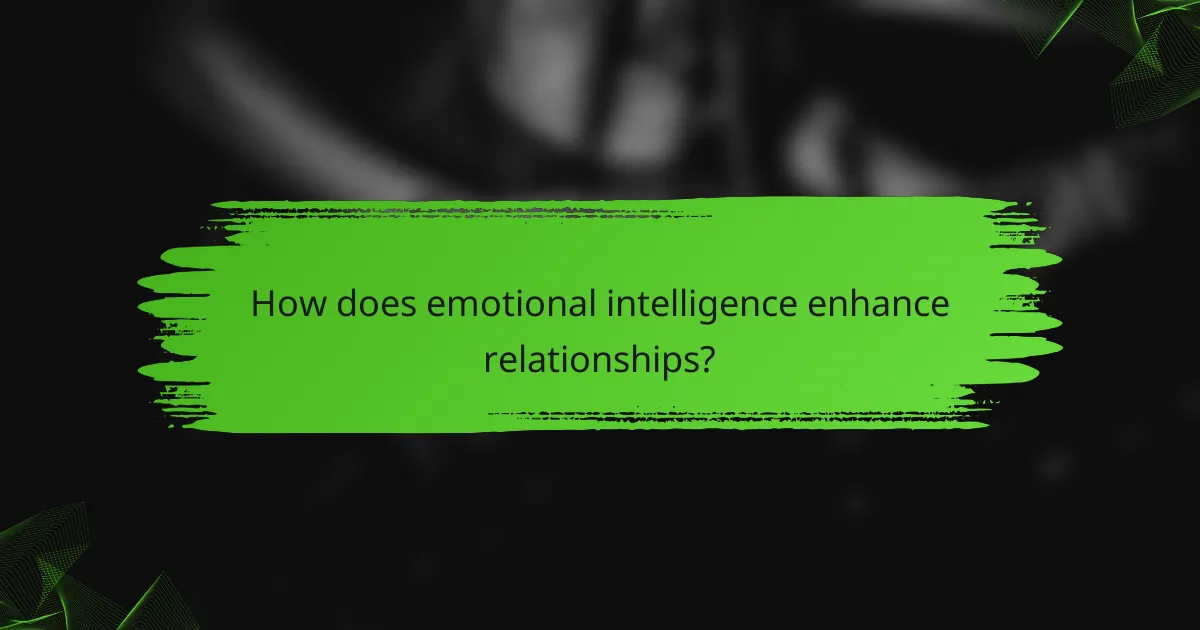
How does emotional intelligence enhance relationships?
Emotional intelligence (EI) enhances relationships by enabling individuals to understand and manage their own emotions while effectively recognizing and influencing the emotions of others. This skill set fosters healthier interactions, builds trust, and promotes deeper connections.
Improves empathy and understanding
Emotional intelligence significantly improves empathy, allowing individuals to better understand the feelings and perspectives of others. By actively listening and being aware of non-verbal cues, people can respond more compassionately, which strengthens interpersonal bonds.
To enhance empathy, practice active listening techniques such as summarizing what the other person has said and asking clarifying questions. This not only shows that you value their feelings but also helps in building a more supportive environment.
Strengthens conflict resolution skills
Emotional intelligence plays a crucial role in resolving conflicts by helping individuals remain calm and composed during disagreements. This ability to manage emotions allows for more constructive dialogues, reducing the likelihood of escalation.
When facing conflict, focus on identifying the underlying emotions at play. Use “I” statements to express your feelings without blaming others, which can lead to more productive discussions and a quicker resolution.
Fosters deeper connections
Building emotional intelligence fosters deeper connections by encouraging vulnerability and openness in relationships. When individuals feel safe expressing their emotions, it creates a stronger sense of trust and intimacy.
To cultivate deeper connections, share your thoughts and feelings honestly while inviting others to do the same. Regularly check in with loved ones about their emotional well-being, which can help maintain and strengthen these important bonds over time.
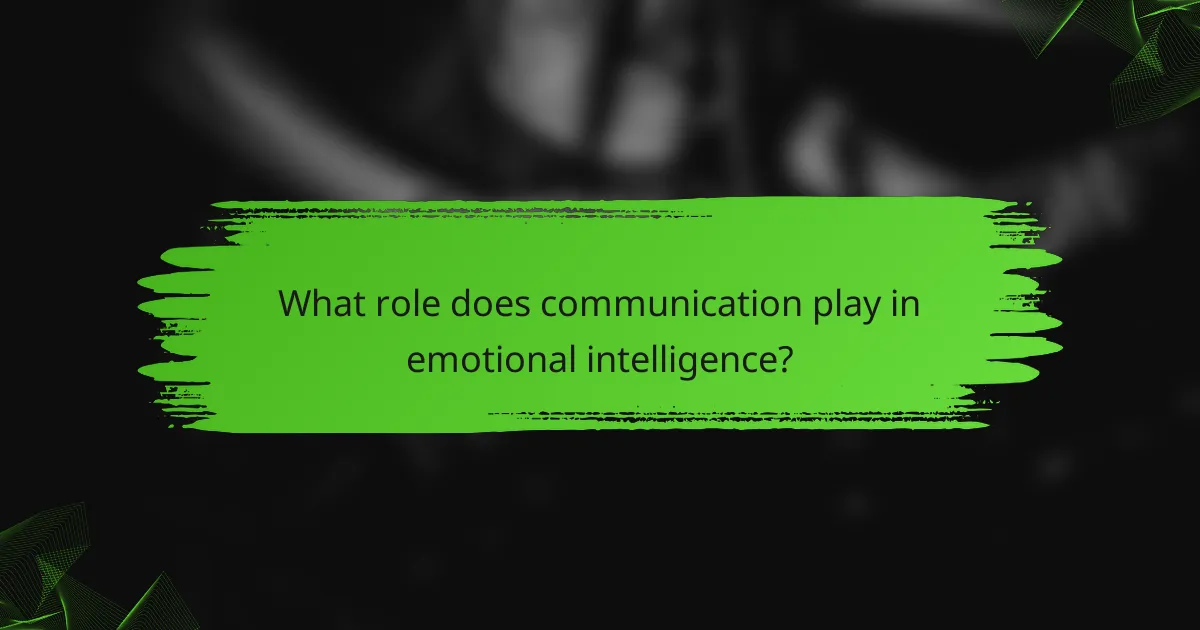
What role does communication play in emotional intelligence?
Communication is essential in emotional intelligence as it enables individuals to express their feelings and understand others’ emotions. Effective communication fosters stronger relationships, enhances trust, and facilitates conflict resolution.
Facilitates active listening
Active listening is a critical component of effective communication in emotional intelligence. It involves fully concentrating, understanding, and responding thoughtfully to what others are saying. Practicing active listening can improve relationships by showing empathy and validating others’ feelings.
To enhance active listening, focus on the speaker without distractions, maintain eye contact, and provide feedback through nodding or verbal affirmations. Avoid interrupting, and instead, wait for the speaker to finish before responding.
Encourages open dialogue
Open dialogue is vital for fostering trust and transparency in relationships. It allows individuals to share their thoughts and feelings without fear of judgment. Creating an environment where open dialogue is encouraged can lead to deeper connections and better understanding among individuals.
To promote open dialogue, ask open-ended questions and be receptive to feedback. Ensure that conversations are held in a safe space where everyone feels comfortable expressing their views. Avoid defensive reactions to maintain a constructive atmosphere.
Enhances non-verbal cues
Non-verbal cues, such as body language and facial expressions, play a significant role in communication and emotional intelligence. These cues can convey emotions and intentions that words may not fully express. Being aware of non-verbal signals can enhance understanding and connection in conversations.
To improve your awareness of non-verbal cues, observe others’ body language and facial expressions during interactions. Pay attention to your own non-verbal signals as well, ensuring they align with your verbal messages. This alignment can strengthen trust and clarity in communication.

How can emotional intelligence build trust?
Emotional intelligence builds trust by enhancing understanding and connection between individuals. It enables people to navigate their emotions and those of others, fostering a safe environment for open communication.
Promotes transparency
Emotional intelligence encourages transparency by facilitating honest and open dialogue. When individuals express their thoughts and feelings clearly, it reduces misunderstandings and builds a foundation of trust.
For example, sharing intentions and motivations behind decisions can help team members feel more secure and valued. This openness can lead to stronger relationships and a more cohesive environment.
Encourages reliability
Reliability is a key component of trust, and emotional intelligence plays a significant role in fostering it. Individuals with high emotional intelligence are more likely to follow through on commitments and be consistent in their actions.
To enhance reliability, practice active listening and respond thoughtfully to others’ needs. This approach not only demonstrates dependability but also reinforces trust within the relationship.
Fosters vulnerability
Emotional intelligence creates a safe space for vulnerability, which is essential for building deep trust. When individuals feel comfortable sharing their fears and insecurities, it strengthens their connections with others.
Encouraging vulnerability can be as simple as sharing personal experiences or expressing empathy during difficult times. This mutual openness can lead to stronger bonds and a more supportive atmosphere.
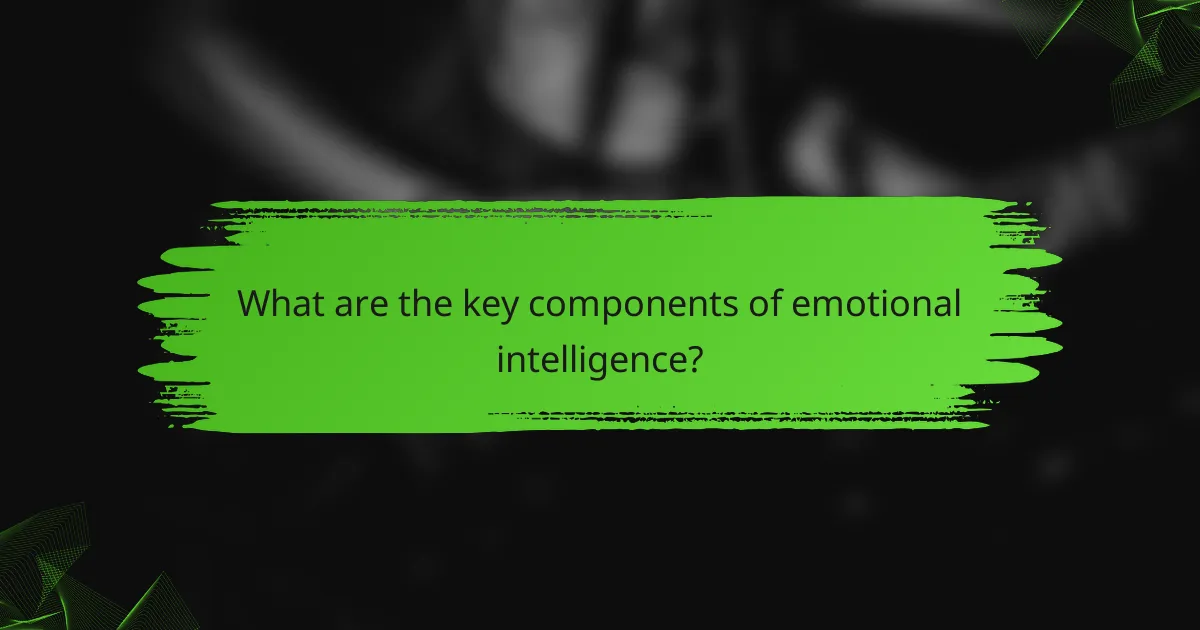
What are the key components of emotional intelligence?
The key components of emotional intelligence include self-awareness, self-regulation, and social skills. These elements work together to enhance interpersonal relationships, improve communication, and build trust in various settings.
Self-awareness
Self-awareness is the ability to recognize and understand your own emotions, strengths, and weaknesses. This awareness allows individuals to assess how their feelings influence their thoughts and behaviors, leading to better decision-making.
To improve self-awareness, consider keeping a journal to reflect on your emotional responses in different situations. Regularly seeking feedback from trusted peers can also provide valuable insights into how you are perceived by others.
Self-regulation
Self-regulation refers to the ability to manage your emotions and impulses effectively. It involves controlling emotional reactions and maintaining composure, especially in challenging situations. This skill is crucial for fostering a positive environment and making rational decisions.
Practicing mindfulness techniques, such as deep breathing or meditation, can enhance self-regulation. Additionally, setting clear personal goals can help you stay focused and avoid impulsive actions that may undermine your objectives.
Social skills
Social skills encompass the ability to communicate effectively, build relationships, and work collaboratively with others. Strong social skills are essential for establishing trust and rapport in both personal and professional contexts.
To develop social skills, actively engage in conversations and practice active listening. Joining groups or teams can provide opportunities to enhance your interpersonal interactions and learn to navigate various social dynamics.
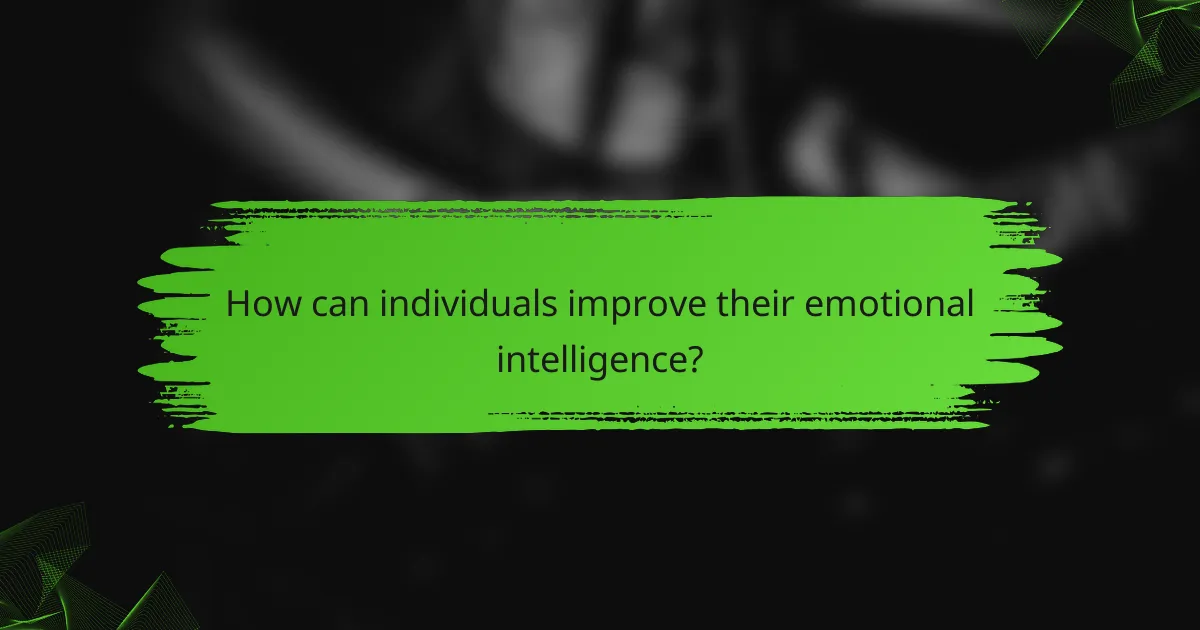
How can individuals improve their emotional intelligence?
Individuals can enhance their emotional intelligence by developing self-awareness, empathy, and effective communication skills. This involves actively engaging in practices that foster emotional understanding and interpersonal relationships.
Practice mindfulness techniques
Mindfulness techniques help individuals become more aware of their emotions and reactions in real-time. By focusing on the present moment, one can better recognize emotional triggers and manage responses effectively.
Simple practices include meditation, deep breathing exercises, and mindful observation of thoughts and feelings. Setting aside just a few minutes daily can significantly improve emotional regulation and awareness.
Engage in reflective journaling
Reflective journaling encourages individuals to explore their emotions and experiences in depth. Writing about daily interactions and feelings can reveal patterns in behavior and emotional responses.
To start, dedicate a few minutes each day to jot down thoughts about significant events or feelings. This practice can enhance self-awareness and provide insights into how emotions influence relationships.
Seek feedback from peers
Seeking feedback from peers can provide valuable perspectives on one’s emotional intelligence. Constructive criticism helps identify strengths and areas for improvement in communication and interpersonal skills.
Consider asking trusted colleagues or friends for specific feedback on how your emotional responses affect interactions. Regularly engaging in this practice fosters openness and can lead to meaningful growth in emotional intelligence.
